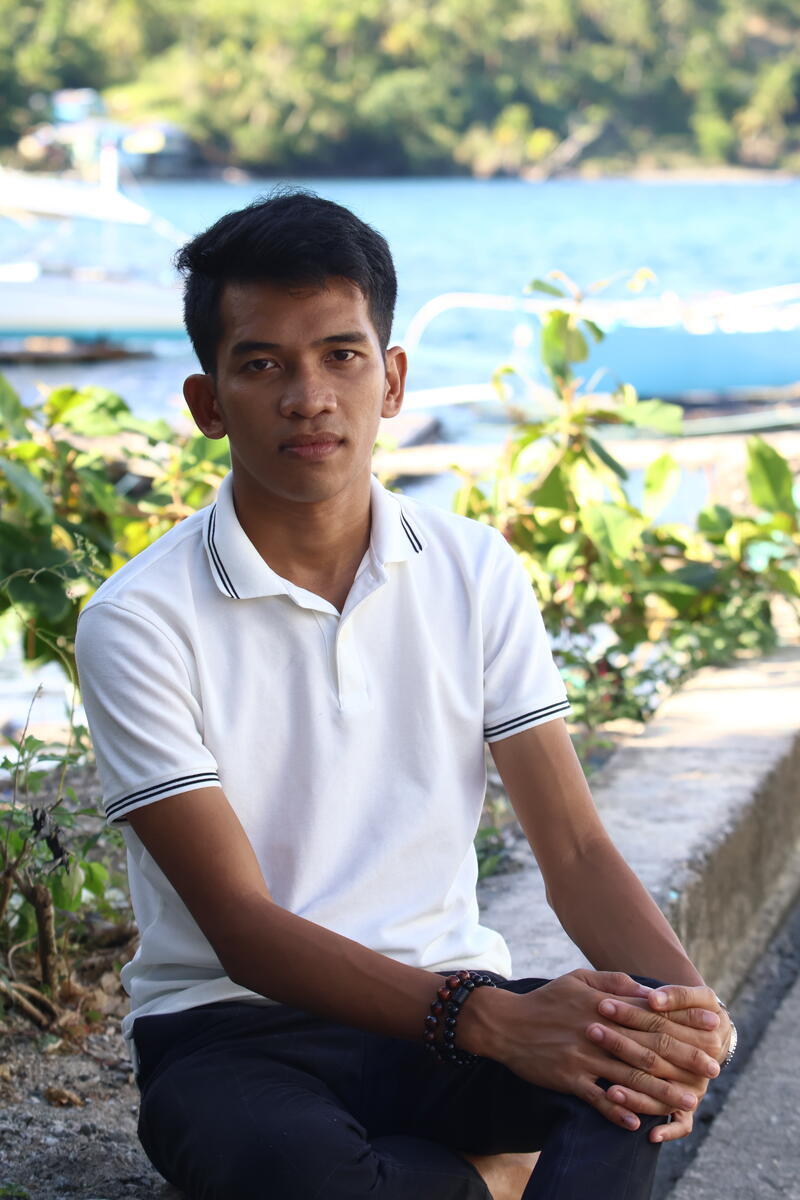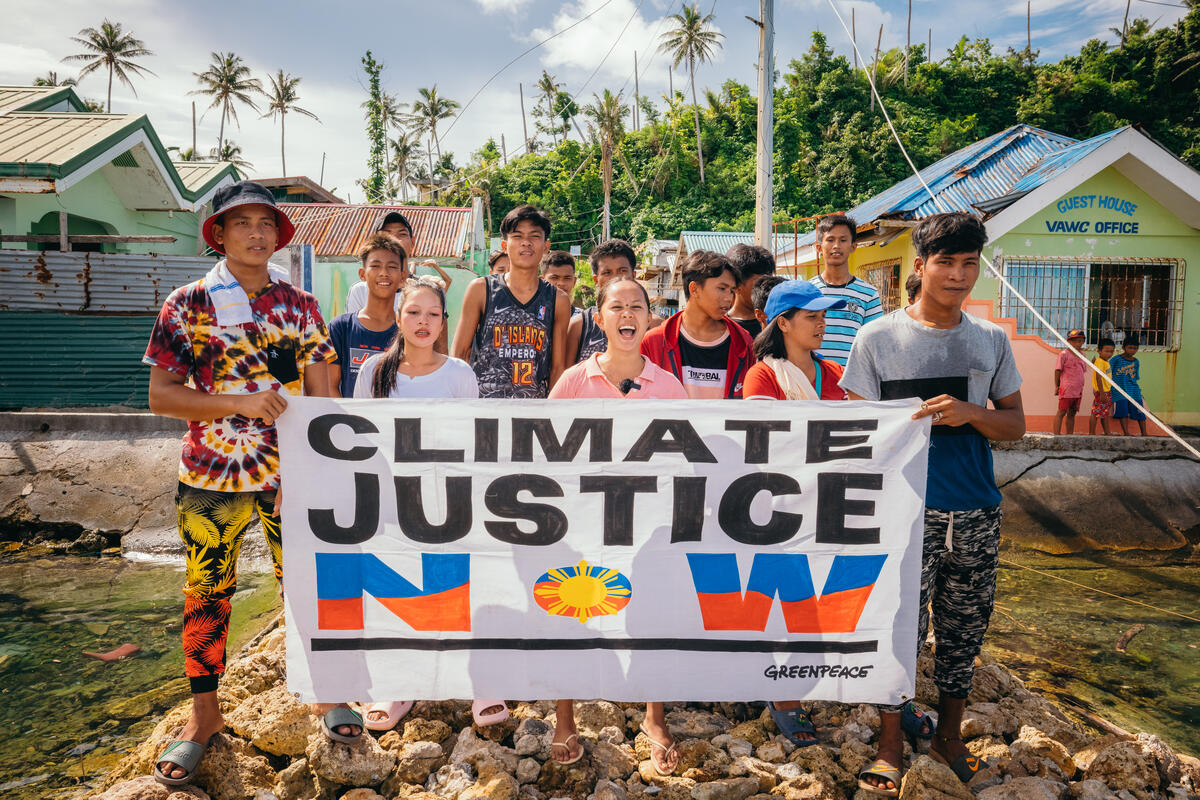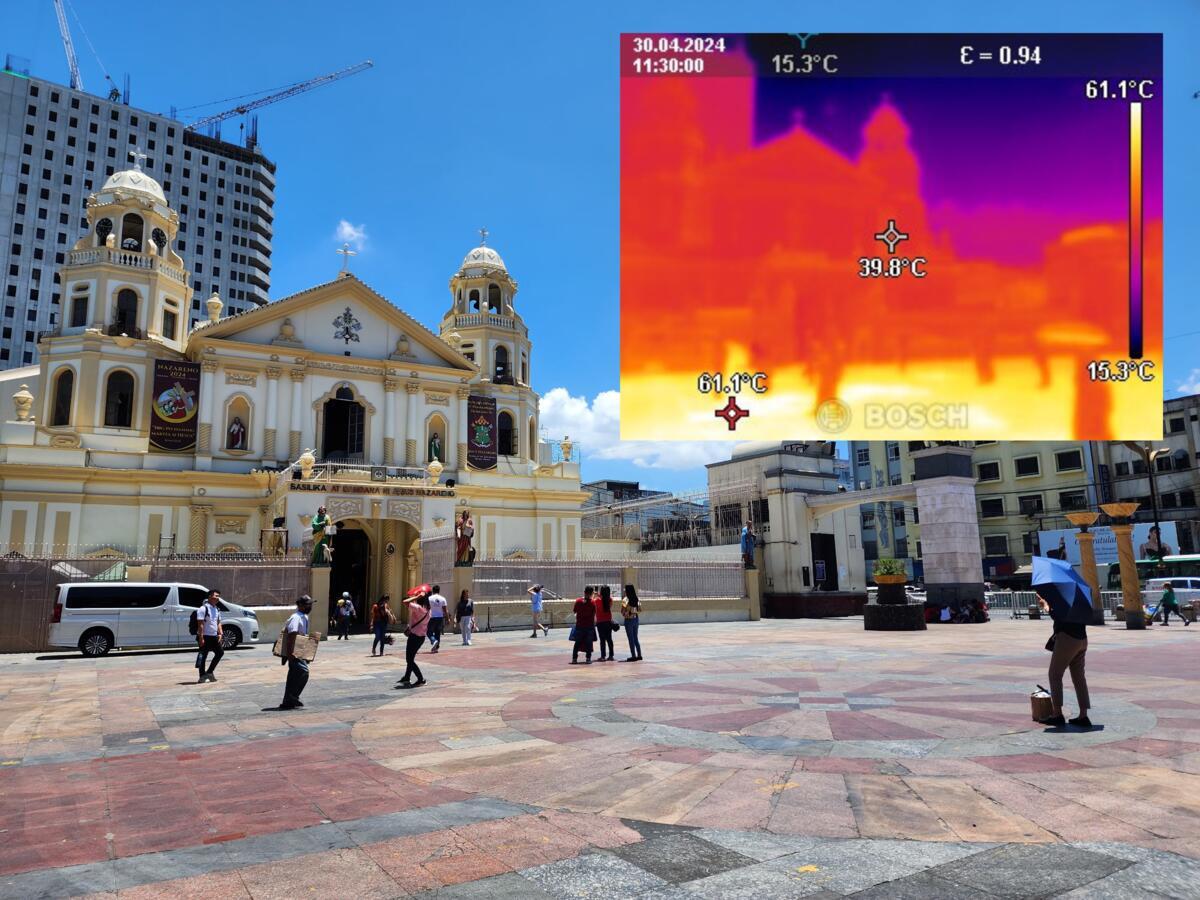Butuan, Philippines/Paris, France — A Filipino has joined a climate litigation against TotalEnergies, in a case filed in France. The legal action, filed this morning in Paris (late afternoon in the Philippines) by eight climate impact survivors from seven countries, as well as three NGOs, is unprecedented in the history of climate litigation, as it opens the way to holding fossil fuel producers and shareholders responsible before criminal courts for the chaos caused by climate change. Greenpeace Philippines, which is supporting the case in the country, is calling on the Philippine government to hold fossil fuel companies accountable for the climate crisis, and demand that they pay for losses and damages.
The individual plaintiffs, from the Philippines, Pakistan, Zimbabwe, France, Belgium, Greece and Australia, and NGOs BLOOM (France), Santé Planétaire (France), and Nuestro Futuro (Mexico) filed a criminal case in Paris against TotalEnergies’ board of directors and main shareholders for their contribution to climate change and its fatal impact on human and non-human lives. The litigation comes in the context of intensifying climate disasters around the world, and was filed just three days before TotalEnergies’ Annual General Meeting.
TotalEnergies, the world’s sixth biggest carbon major, its board of directors, and its main shareholders are being sued for deliberately endangering the lives of others, involuntary manslaughter, neglecting to address a disaster, and damaging biodiversity. Each offense is punishable by at least one year of imprisonment and a fine. The prosecutor will have discretion to open a judicial investigation and to determine the roster of individuals facing prosecution. Nonetheless, the complaint targets the board of directors of TotalEnergies, which determines the group’s strategic direction, including its CEO Mr. Patrick Pouyanné, as well as its main shareholders who voted in favor of climate strategies incompatible with limiting global warming to 2°C, and against resolutions aimed at aligning the Group’s climate strategy with the Paris Agreement. Among the shareholders are the largest, Blackrock, as well as the 6th largest shareholder, Norges Bank.

Frank Nicol Melgar Marba, the sole Filipino plaintiff, is a resident of Dinagat Islands. His family’s house was damaged and his grandmother sustained illness following the onslaught of Super Typhoon (STY) Odette (international name: Rai) in 2021. STY Odette is the second most destructive typhoon to make landfall in the country, after Typhoon Yolanda (international name: Haiyan) in 2013. Dinagat Islands, where Odette made its second landfall, was one of the hardest-hit provinces, suffering an estimated PHP 3.9 billion worth of damages to infrastructure and agriculture, aside from affecting 34,000 families.[1]
“We know that we deserve justice,” Marba said. “We demand TotalEnergies to pay not just for the destruction of our properties, but more importantly for the loss of our livelihood and the trauma that we are still dealing with up to now. Our livelihoods never really fully recovered and whenever there’s news of a typhoon coming our way, my grandmother still shakes in fear being reminded of our ordeal from Typhoon Odette.” Last Saturday, community members of Barangay Melgar in Dinagat Islands held a solidarity action, unfurling a banner with the words “Make Climate Polluters Pay” on a small beach.
“Oil and gas companies like TotalEnergies must pay for losses and damages for climate impacts—we should not make communities who bear the brunt of the disasters shoulder the cost. With climate impacts escalating and costing an estimated 3% of annual GDP,[2] governments like the Philippines should also demand payment for recovery and rehabilitation,” said Greenpeace campaigner Virginia Benosa-Llorin. “The world shouldn’t let climate polluters get away scot-free, and governments need to be supporting communities in their quest for justice.”
The NGOs and eight plaintiffs hope to establish the criminal liability of TotalEnergies’ directors and shareholders for their contribution to climate change and to have them condemned for past decisions, which they took despite knowing they would trigger tremendous casualties and environmental damage.
This case also seeks to put a definitive halt to the expansion of fossil fuel extraction, which is leading to an unprecedented situation: a “globocide”,[3] i.e. the irreversible disruption of the Earth System and the biosphere as a whole. Additionally, plaintiffs wish to obtain recognition that certain persons or entities like TotalEnergies’ board of directors and main shareholders hold a major responsibility in the global destruction of the world as we know it.
Rising sea levels and submerged coastlines, deadly heat waves, mega-fires, devastating hurricanes, floods and landslides: the number of reported weather-related disasters has multiplied by five over the past 50 years,[4] impacting the lives of the eight plaintiffs from Australia, Zimbabwe, France, Belgium, the Philippines, Greece and Pakistan as well as that of million other human beings and billions of animals. The disasters that ravaged their lives, such as the 2019 Australian bushfires, the 2021 European floods, and the 2022 Pakistan floods, have undergone scientific attribution studies, which concluded that climate change made each of them stronger and more likely to occur. Many studies also now recognize that typhoons, as in the case of STY Odette, are getting stronger due to warming oceans.[5]
Scientists have established that so-called ‘natural’ disasters are less and less natural: their increase in intensity and frequency is a direct consequence of climate change, 80% of which is due to fossil fuels.[6]
Although the International Energy Agency has recommended to halt all new fossil fuel projects since 2021 to keep to a 1.5°C pathway,[7] TotalEnergies has kept opening oil and gas sites across the planet.[8] It has even become the second most expansionist fossil fuel company in the world.[9] The scientific community has determined that opening new fossil fuel projects is not compatible with limiting temperature warming to viable thresholds.[10]
Despite being perfectly aware that climate change kills, the directors and shareholders of the multi-billion-dollar multinational have made the choice to expand oil and gas production for a single reason: to maximize profits.
At the 2023 Annual General Meeting, the Board of Directors even called on its shareholders to vote against the resolution to align TotalEnergies’ emissions with the Paris Agreement. This crucial resolution was rejected by 70% of shareholders.[11]
Next, the prosecutor has three months to decide whether to open a judicial investigation. If a decision is made to dismiss the complaint, or if no decision has been taken, the plaintiffs can lodge their complaint directly to an investigating judge.

Greenpeace believes that oil and gas companies must take accountability for their role in abetting the climate crisis: they must stop all planned expansion and commit to a fossil fuel phase out, and start paying communities for losses and damages from climate impacts. In the Philippines, Greenpeace is calling on the Marcos administration to demand payment for loss and damages from fossil fuel companies and rich nations alike and call for and commit to a just transition away from fossil fuels.
Notes to editors
[1] UNDP, Typhoon Odette’s Catastrophe: The Case of Dinagat Islands Province
[2] Changing climates: the heat is (still) on
[3] The word globocide was coined by German philosopher Günther Stern alias Anders (1902-1992) to designate the extermination of human beings by the atomic bomb. BLOOM proposes to use the neologism forged by the thinker of the apocalypse to designate the global devastation that our way of living is generating on the biosphere at large, not just on human beings.
[4] World Meteorological Organization, Weather-related disasters increase over past 50 years, causing more damage but fewer deaths, 2024
[5] Response of damaging Philippines tropical cyclones to a warming climate using the pseudo global warming approach, Evaluating the Increasing Trend of Strength and Severe Wind Hazard of Philippine Typhoons Using the Holland-B Parameter and Regional Cyclonic Wind Field Modeling, How the climate crisis is making typhoons worse
[6] United Nations, Causes and Effects of Climate Change
[7] International Energy Agency, Net Zero Roadmap, 2023
[8] BLOOM, the Renewable Energy Joker, 2023
[9] Global Oil and Gas Exit List 2023
[10] Carbon Brief, New fossil fuels ‘incompatible’ with 1.5°C goal, 2023`[11] Bloomberg, Total Asks Investors to Oppose Call to Cut Indirect Emissions, 2023
Media Contact
Maverick Flores, Greenpeace Communications Campaigner
[email protected] | +63 9176211552
Karl Orit, Greenpeace Communications Campaigner
[email protected] | +63 9194571064



